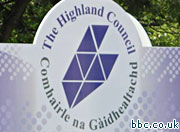Highland Council has removed prayer from its formal meeting agenda after secularists threatened legal action.
The decades-old tradition will now be held prior to the formal meeting, in a move criticised by one councillor as a “manifestation of political correctness”.
The National Secular Society (NSS) wrote to the Council in the summer calling for the saying of prayers to be dropped or face legal action.
Compromise
A note was then written to all 80 councillors in the Highlands stating that: “Time for Prayer and Reflection will be undertaken at 10.30am in the chamber” in future for those who wish to attend.
“This will be preceded by the bell to signal commencement.”
A second bell will ring to inform councillors the meeting is about to start, five minutes later than normal, at 10.35am.
Forced
But Inverness councillor Roddy Balfour criticised the move although he said the authority’s hand had been forced.
He said: “This is yet another manifestation of political correctness and human rights. This is the world in which we live in, goodness knows where it is going to end. The traditions are being eroded away.”
Earlier this year the NSS won a legal case forcing an English council to drop prayers from its meeting agendas.
Threats
But a Government minister fast-tracked new laws which supercede the court’s decision.
Nevertheless the NSS wrote to Highland Council threatening legal action unless they drop the prayers from the formal meetings.
A council spokesman said: “As a result of the current ruling we have taken on board the request to keep it off the agenda. It is not on the agenda. The first bell will just clarify and make it clear to those who wish to take part.”
Scrapped
Alister McBay, spokesman for the NSS, praised the Council’s decision and said it sounded like a “vast improvement” on the previous practice but would reserve judgement until he had watched the internet webcast of the meeting.
In June Edinburgh City Council scrapped the saying of prayers during council meetings and replaced them with a ten-minute “pause for reflection”.

